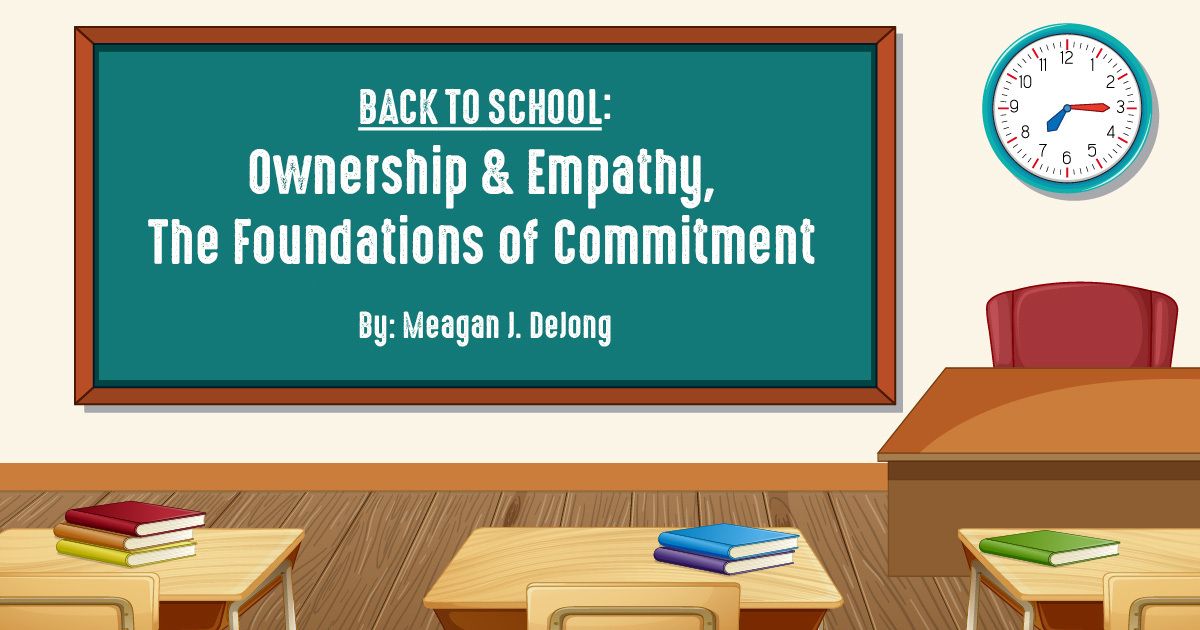Welcome back to our three-part “back to school” series that, very metacognitively, teaches us what teachers can teach us about the concept of audience. Let’s start with the two most vital components of any commitment or partnership, whether it be in the classroom or between clients: ownership and empathy.
Ownership
Socrates said that knowing one’s self is the beginning of all wisdom, and I think many teachers agree. Shakespeare via Polonius in Hamlet extended that idea a little to a directive of sorts: “to thine own self be true.” Bingo. Teachers cannot enter their classroom trying to be a sixteen-year-old who desperately wants to impress; nor can they enter their classroom pretending to be a pompous professor in an attempt to intimidate with ego. All a teacher can do is enter their classroom fully inhabiting their truest self.
This is not as easy as it sounds. Students will find any weakness and they will exploit it, no matter how nice or “cool” or smart the teacher thinks they are. The antidote to this is for the teacher to be a student of herself, and over time become so fully aware of herself that she is simply unbothered by the good, the bad and everything in between. Heck, with some bravery, teachers can even let their internal voice become external at times. They can be self-deprecating and use humor. Crazy, right?!
For example, when Domino’s Pizza began receiving complaints from customers about the declining quality of their product and slow delivery time–among other issues–throughout the early aughts, their response was to take to television, Facebook, and Twitter/X with a multifaceted marketing approach that conveyed a clear message: we hear you, and we’re changing. They did not attempt to posture themselves as something they are not, or waste time being bothered by or even denying the criticisms they received. Instead, they realized (rightly) that their customer is their most important asset, along with their ability to listen openly and authentically. Their reward for practicing self-reflection and awareness, and for being students of themselves, were record profits and becoming the leading pizza chain in the US.
Turns out that authenticity is just vulnerability. As an example, were I in a lecture hall or even in some type of virtual meeting right now, I’d totally make fun of myself for quoting Socrates and Shakespeare, which is eye-rollingly, nauseatingly pretentious but also very accidental, I swear: usually I’m far more likely to quote song lyrics. I hear you saying, Gimme a break with the references already. Nerd! And rest assured, I wholeheartedly agree with you. Moving on.
Empathy
Know your audience…but really know them. This takes a lot of work, probably the most work of anything listed here. It’s why teachers are sort of like sleuthy magicians. Basically, teachers need to know all of their students. All of them–because every student is an audience member, and every audience member is an influencer in the classroom.
To really know your audience is a tricky thing, and goes beyond what brand of soda someone drinks or the clothes they wear (although those are pieces of the larger picture, too, albeit tiny ones). What a student or any audience reveals cannot be bought, and it’s difficult to teach someone how to know another person. It’s not a token and it can’t be timed. It’s built almost entirely on trust, and if a teacher’s emotional armor is too thick they will never truly pierce their audience’s defenses, and build ethos.
One shining example of this empathetic approach that can’t be timed, faked, or bought is the Allbirds “We’re Better Together” campaign that emerged at the height of the Coronavirus pandemic. At this time, there were many companies who decided to contribute financially. Allbirds, too, donated millions of dollars worth of footwear to frontline healthcare workers; but they also went a step further. Through the campaign, they also created a way for customers to donate money towards their own purchase of a pair of shoes for frontline healthcare workers. This achieved two vital components that demonstrate trust and understanding: most importantly, it showed empathy through actions that support their customers, and not mere words; but it also showed that they know and share their audience’s values and humanity, especially during a time of crisis and upheaval. They did not just display empathy for the workers who continue to keep us safe and healthy but showed empathetic leadership by revealing that their audience could also choose to join them in taking action to help. It’s worth noting that they also extend that action to their own employee policies and in environmental sustainability policies. Allbirds built upon the foundations of trust they had already established by communicating that “We’re Better Together” when we actually act in ways that align with our shared values rather than paying it lip service.
Knowing your audience is delicate and requires patience. It’s worth remembering during this wonderfully spooky season, that spellbinding, enchanting, magical empathy is a vital part of good writing and audience trust; but it’s not witchcraft, it’s just good sense!
Meagan supports LMD's work with the Cybersecurity and Infrastructure Security Agency (CISA) as a writer using her nearly two decades of experience. Meagan has an intuitive understanding of audience and rhetorical narrative that she has developed over many years through a unique blend of empathy and expertise.
Meagan graduated from Montclair State University with an M.A. in English writing studies and a graduate certificate in teaching writing. She earned a B.A. in English from Centenary College.
